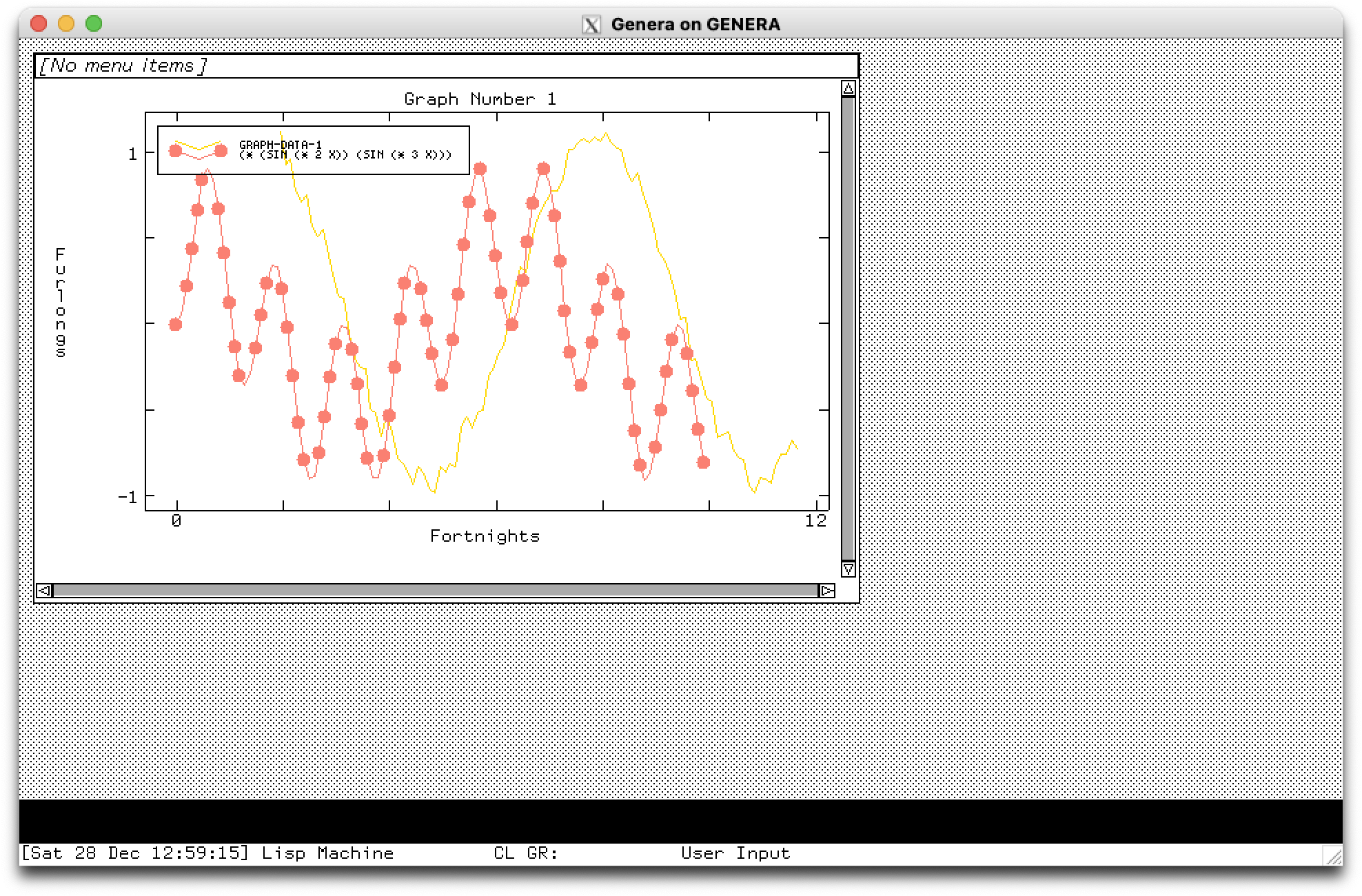Port SCIGRAPH and CL-PPCRE to Open Genera
About
I was recently consider using Symbolics Open Genera as my second programming environment.
Pros:
- nice developing experience
- can learn a lot from its design for building my future projects
Cons:
- missing some useful packages (for example, CL-PPCRE for regexp, QuickLisp for package managing, …)
- toooooooooo much documentation (manual) to read (good, yet a little difficult to read them all)
- some protocol is bit old and not function well (NFSv2 and NFSv3, which made me headache for days)
But any way, I thought it was generally a charming experience. Right now, I've made OpenGenera running successfully within the QEMU and Docker (little faulty due to NFSv2/3, documentation reading is not avaliable… ).
The future route will be like:
- porting some existing Common Lisp library (SCIGRAPH and CL-PPCRE in this post) as Genera System
- build a RPC interface for distribute computation to host machine for heavy computations (or I think I'll just copy the code from Genera to SBCL and they could run nicely)
- some reverse engineering on
vbin? (possibly, I am not sure if I'd be able to do so) - … (if I'd be free)
So here is how I port SCIGRAPH and CL-PPCRE:
SCIGRAPH
Since it's designed with support for Genera, the portation is easy. So the process looks like this:
- add
scigraph.systemundersys.cst/site, with things like:;;; -*- Mode: LISP; Syntax: Common-lisp; Package: USER; Base: 10; Lowercase: Yes -*- (sct:set-system-source-file :scigraph "SYS:SCIGRAPH;SYSDCL")
this will tell Genera where to look for system definition file. In this case, the file should be
sys.sct/scigraph/sysdcl.lisp - set the load package method at
sys.sct/scigraph/sysdcl.lispmaybe you could refer to
sys.sct/concordia/concordia.lispfor how to writedefsystemto specify the system compoents.;;; -*- Mode: LISP; Package: USER; Syntax: Common-Lisp; Base: 10 -*- (in-package :user) ;;; ... (defsystem scigraph (:pretty-name "Scigraph" :default-pathname "SYS:SCIGRAPH;" :source-category :basic :distribute-sources T :distribute-binaries NIL) (:module components (scigraph-dwim scigraph-core) (:type :system)) (:serial components)) (defsubsystem scigraph-dwim (:pretty-name "SciGraph DWIM" :default-pathname "SYS:SCIGRAPH;DWIM;" :source-category :basic :distribute-sources T :distribute-binaries NIL) (:serial "package" ;; ... load from load-dwim.lisp ... )) ;;; ...
the original system loading process is defined in
load-dwim.lispandload-scigraph.lisp.In short: to port a system to Genera, just rewrite the original
load-*.lisptosysdcl.lispto define a system in Genera. - to load Scigraph, should
Load System CLIM,Load System Genera-CLIM,Load System Postscript-CLIM,Load System CLX-CLIMbeforeLoad System Scigraph. - test with
(graph:make-demo-frame)to see if loaded properly
Note: mostly working, but seemed to be a little buggy?
Note: after I've done this, I found something like dwim-system.lisp
and scigraph-system.lisp, I think which could be used as the porper
loader of sysdcl.lisp instead. for example, maybe I could write
scigraph.system like:
(sct:set-system-source-file :scigraph "SYS:SCIGRAPH;DWIM;DWIM-SYSTEM")
(sct:set-system-source-file :scigraph "SYS:SCIGRAPH;SCIGRAPH;SCIGRAPH-SYSTEM")
But anyway, it works and I don't see urgency to use it…
CL-PPCRE
Since OpenGenera doesn't support and has some feature missing? for example:
(declare (fixnum ...))will not be treated like(declare (type fixnum ...))(lambda ...)will not be treated like#'(lambda ...)(in SBCL)(coerce ... 'simple-string)will not work properly, so I changed them as(coerce ... 'string)to make it compile pass…not sure how this will affect the performance… and not sure if need to change more…
I think I have to change these codes to make it work on OpenGenera. Meanwhile, I thought it would be difficult to keep consistency with current CL-PPCRE version. (maybe you could call it in Chinese “魔改”).
Just test with Advent Of Code 2024 Day 3's problem:
;; -*- Package: CL-PPCRE -*-
(let ((input "xmul(2,4)%&mul[3,7]!@^do_not_mul(5,5)+mul(32,64]then(mul(11,8)mul(8,5))")
(sum 0))
(do-matches-as-strings (m "mul\\((\\d{1,3}),(\\d{1,3})\\)" input)
(let ((mul 1))
(do-matches-as-strings (d "\\d+" m) (setf mul (* mul (parse-integer d))))
(incf sum mul)))
sum) ; => 161
Finally
So, this two patches has now been ported into Symbolics OpenGenera (#05e6f03 and #66dc2c3). Though its shame to declaim, but I could tell there must be some hidden bugs since I'm still not a mature Lisp Programmer. Contributions and helps are welcomed.
So, what to do next?
- port or make some simple HTTP downloader package (maybe dexador or something else), but this would be sure more difficult though
- do some simple programming on CLIM (I was always curious about it, but the McCLIM often fail to boot on my macOS)
- try to fix Document Examiner and NFSv3 (no clue)
- RPC to host PC for heavy computation (maybe should base on TCP/IP)